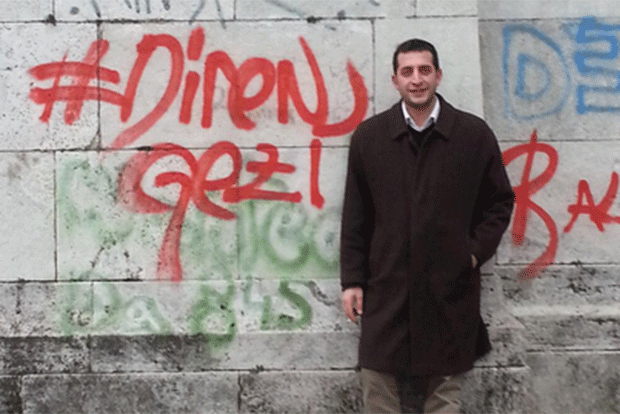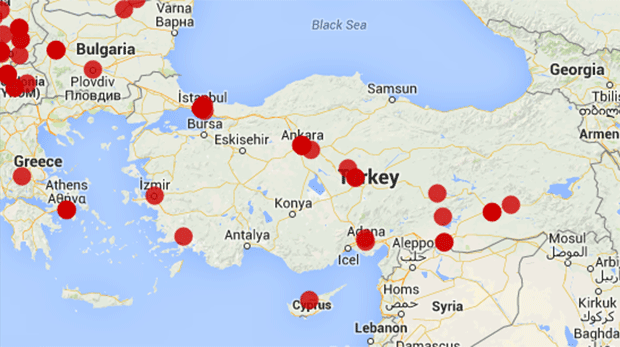11 Nov 2014 | Azerbaijan, Azerbaijan Statements, Campaigns, Statements
Azerbaijan’s six-month chairmanship of the Committee of Ministers of the Council of Europe, Europe’s top human rights body, comes to an end this week. During this period Azerbaijan unleashed an unprecedented crackdown against civil society—including the imprisonment of human rights defenders and political activists who criticised the government.
Index on Censorship joins the Civic Solidarity Platform’s call to the Council of Europe to put real pressure on Azerbaijan to reverse its actions and release all those who have been imprisoned on unfounded charges.
“The chairmanship turned into a demonstration of strength for the Azerbaijani government. It showed that evil can be stronger than values. The government used the chairmanship in an organisation which is based on human rights to prove to its citizens, and to the world, that money and power trump values. It is time to save these values, the commitments and the soul of the Council of Europe. Now,” said Azeri investigative journalist, Khadija Ismayilova.
The Secretary General of the Council of Europe, Thorbjørn Jagland, and its democratic member states must confront Azerbaijan and consider punitive measures in response to this crackdown. To date, the Council of Europe has responded with nothing more than statements of condemnation. Azerbaijan’s actions are an attack to European institutions and values, and this must not go unnoticed.
Those imprisoned during Azerbaijan’s chairmanship (14 May – 13 November 2014) include:
– Anar Mammadli, election monitor who received the Václav Havel Human Rights Prize.
– Leyla Yunus, justice advocate who received the French Legion of Honor.
– Rasul Jafarov, human rights campaigner who criticized Azerbaijan at the Council of Europe and compiled with Layla Yunus a list of 100 political prisoners in Azerbaijan.
– Intigam Aliyev, human rights lawyer who criticized Azerbaijan at the Council of Europe.
For more information please contact:
Simon Papuashvili, [email protected]
Andrei Aliaksandrau, [email protected]
Melody Patry, [email protected]
11 Nov 2014 | Egypt, News, Press Releases, Religion and Culture

Graffiti artists, cartoonists, dancers and actors are fighting back against rising levels of violence and sexism in the streets of Cairo, according to a new documentary from freedom of expression charity Index on Censorship.
Documentary maker Melody Patry interviewed actors, dancers and other artists around Egypt, where 99% of women have experienced some form of sexual harassment, and 80% feel unsafe on the street. Sexual violence has risen sharply in Egypt in the past few years. During the period February 2011 to January 2014, Egyptian women’s rights groups documented thousands of cases of sexual harassment, as well as crimes of sexual violence against at least 500 women, including gang rapes and mob-sexual assaults with sharp objects and fingers.
With police, politicians and the judiciary seeming incapable of tackling the issue effectively, activists are turning to the arts to help lead the fight back. “Art is one of the most necessary mediums to impact society,” says Deena Mohamed who created a web-comic about a hijab-wearing superheroine who fights daily sexual harassment. “For people who are unaware of the issues women go through, I hope it helps them understand or at least give them something to think about.”
An interactive documentary intended as a “living report” that will be continuously updated, Shout Art Loud shows how Cairo residents are using different tactics to fight rising sexual harassment, including pro-women graffiti, drama workshops and street performances.
“We believe that spreading images, things that people are familiar with, women figures that people know and sayings that people know brings back some positivity about women in general,” says Merna Thomas, co-founder of a graffiti campaign to promote women’s rights in Cairo’s public spaces.
See how Egyptians are using theatre, dance, music and street art to tackle the issue of sexual harassment and violence against women in Egypt in this interactive documentary, which features interviews with artists, original artwork, videos and performances, including from Index’s 2014 Freedom of Expression Arts Award winner Mayam Mahmoud. You can access the documentary here: indexoncensorship.org/shoutartloud
“This innovative documentary is a reminder of the vital role artistic expression plays in tackling taboo subjects like sexual violence — in Egypt and beyond,” said Index CEO Jodie Ginsberg. “We want to bring this issue to a wider audience to show just how important artists and writers can be in bringing about change, and to tell the story in a new way.”
For further information and interview requests, please call +44 (0)207 260 2660
10 Nov 2014 | China, News, Tibet
![Photo: Wolfgang H. Wögerer, Vienna, Austria [CC-BY-SA-3.0 (http://creativecommons.org/licenses/by-sa/3.0) or CC-BY-SA-3.0 (http://creativecommons.org/licenses/by-sa/3.0)], via Wikimedia Commons](https://www.indexoncensorship.org/wp-content/uploads/2014/11/Vienna_2012-05-26_-_Europe_for_Tibet_Solidarity_Rally_158_Lobsang_Sangay.jpg)
Lobsang Sangay at a solidarity rally for Tibet in 2012 (Photo: Wolfgang H. Wögerer, Vienna, Austria [CC-BY-SA-3.0 or CC-BY-SA-3.0], via Wikimedia Commons)
It was not, to say the least, what he had been expecting. Just a few weeks earlier, Sangay had become Tibet’s new political leader, taking over all political authority from the Dalai Lama after winning an election held among exiled Tibetans all across the world. It had been his first day in parliament in Dharamsala, where the Central Tibetan Administration (CTA) is based, and his entire cabinet had just been unanimously approved — a cause for celebration.
Yet that same day, a top-secret memo about an upcoming visit to the US had somehow been obtained from the government’s computers, and leaked into the public domain. “Everything was supposed to be very confidential, and the memo was only meant for three people in Washington DC,” Sangay tells Pao-Pao.
His assistants recommended cancelling the trip altogether. “It’s all out,” they told Sangay. “Nothing is a secret.” Their worries were not unwarranted. The Chinese government had started pressuring the American politicians listed in the memo to cancel their meeting with Sangay. Still, he pushed ahead. “I said: ‘We are going to Washington DC, on the same dates as described in the memo, and we are meeting with the same people as in the memo. That’s the only way we can respond to Beijing’s bullying.’”
Security upgrade
In the end, the visit went ahead as planned. But the attack was a shock to Sangay. “First of all, that Beijing is so capable of penetrating our computers that they can get at even our very confidential memos,” he says. “But also, that when I came back to the office, they were logging into every computer in the office and trying to shut it down, trying to track down which computer was affected with a virus and how they stole the secret memo. The whole place was shut down.”
It wasn’t the first time that the Tibetan administration had found itself under Chinese cyber attack. In 2008, the large-scale cyber spying operation Ghostnet managed to extract emails and other data from the CTA. Ghostnet also affected other Tibet-related organisations, as well as embassies and government organisations across the world. A year later, ShadowNet was employed, which researchers from the Infowar Monitor (IWM) at the University of Toronto called a form of “cyber espionage 2.0”.
The IWM researchers were able to establish that the hackers worked from within China, but they have been hesitant to link these hackers to the Chinese government due to a lack of direct evidence. However, an American cable released by Wikileaks describes a “sensitive report” that was able to establish a connection between the attackers’ location and the Chinese army.
The 2011 attack propelled Sangay to tighten the administration’s digital security. “At the time, there was a different mindset about it: ‘Oh, we can’t do much about it, Beijing can do whatever it wants,’” he recalls. Sangay, who was an outsider to Tibetan politics and had spent the sixteen years before he was elected at Harvard Law School, didn’t agree. “I thought that we could upgrade our security to a certain level. Now, even if we have a virus, it’s only on one computer, we can isolate it.”
But while the CTA’s office might no longer grind to a halt when a computer is infected, attacks have continued unabated. In 2012, a Chinese cyber attack infiltrated at least 30 computer systems of Tibetan advocacy groups for over ten months. In 2013, the CTA’s website Tibet.net was compromised in a so-called watering hole attack, which allows hackers to spy on and subsequently attack website visitors.
Greg Walton, an internet security researcher at Oxford University, is concerned at the growing number of these watering hole attacks. When they are combined with attacks that exploit software vulnerabilities, he argues that “there is essentially no defence for the end user, and no amount of awareness or training will mitigate the threat.”
Sangay does not believe that absolute security is possible. “Beijing is still, I am sure, trying to steal things. And I am sure they are successful, in some sense. But we also have to try to make it a little more difficult,” he says. “I assume my email is being read on a daily basis. The Pentagon, the CIA, multinational companies are all being hacked, and they are spending hundreds of millions to protect themselves.”
Sangay throws up his hands: “Poor me! My administration’s budget is around 50 plus million dollars. Even if I would spend my whole budget to protect my email account, that still wouldn’t be enough.”
No attachment, please
Sangay does believe that many problems can be avoided with a few basic precautions. He uses very long passwords for instance, and changes them often to prevent hacks of his own email account. And, he says: “You always have to follow Buddha’s message. What would Buddha say if you send him an email? ‘No attachment please!’” Sangay laughs. “One of the cardinal sins in Buddhism is attachment. Well, Buddha’s lessons, who said that 2,500 years ago, are still valid.”
Holding himself to “Buddha’s teachings” has prevented Sangay from getting his computer infected many times — although there have been some close calls. Take for example the time Time magazine’s editor Hanna Beech emailed him, a week prior to a scheduled interview in Dharamsala.
“She sent me the ten questions she would ask me. I found that very generous, journalists sending me questions ahead of time!” Sangay was about to download the attachment — but then he paused. “I grew a bit suspicious, so I decided to write back to her to ask if it was really her.” Beech said it wasn’t.
The attack was sophisticated, but not uncommon, Sangay says. “We get that on a daily basis, literally; some Tibetan support group or someone from our office sends an email that will contain a virus.”
Strengthening bonds
For the Tibetan government, digital communications have offered Chinese hackers a welcome point of attack. But Sangay also emphasises the positive sides of the internet: “Despite the [Great] Firewall, information breaks through, and is exchanged. That is happening, and that is not something that the Chinese government or any other government can prevent.”
He points to the 2008 protests in Tibet as one example. In the protests, which some dubbed “the cellphone revolution”, written reports, videos and photos from eyewitnesses were able to make their way to the rest of the world via mobile phones.
Additionally, the internet has allowed the Tibetan Central Administration in Dharamsala, home of about 100,000 Tibetans, to strengthen its bonds with the approximately 50,000 exiled Tibetans living elsewhere. Sangay says that the exile community — “scattered across some forty countries” — keeps in touch mainly through the internet.
“The internet has been very vital. The other day, I was speaking to Tibetans in Belgium. I asked them how many log in to Tibet.net, our website, and how many watch Tibetan online TV. About 40% raised their hands.” Tibetans from inside Tibet even manage to send Sangay “one-off messages” via Facebook from time to time. “Things like: ‘I wish you well’, from Facebook accounts that are immediately deleted.”
Dangerous, but helpful
Tibetans inside and outside of China now also communicate constantly via WeChat, but that is not without danger. A year ago, two monks in Tibet were arrested and jailed after posting pictures of self-immolations via the chat app. “Many say it’s very dangerous, because it’s an app by a Chinese company,” Sangay concedes. Still, he also considers it “very helpful and informative” as long as it is used to discuss safe topics.
The Tibetan administration consciously abstains from contacting Tibetans inside China “for fear that we might jeopardise them,” Sangay says. “We get a little less than 100,000 readers to our website every month, and we know many are from inside Tibet and China as well. We know it’s happening, but we really don’t make deliberate efforts [to contact them], and we also don’t keep track.”
Skyping with Woeser
Since Sangay was elected, it has been too risky for him to keep in touch with Tibetans in China via the internet. But before his election, like many others, he was in touch with those inside China almost every day. During his years at Harvard, he often Skyped with the famed Tibetan blogger and activist Tsering Woeser.
“It almost became an everyday ritual. I would go to the office, and then at a particular time I would log on and we would talk for half hour or more. Because her Tibetan wasn’t good, I became her unpaid, amateur Tibetan language teacher.” Sangay laughs as he recalls Woeser’s unsuccessful attempts to crack jokes in her — at the time — mediocre Tibetan.
Unfortunately, Sangay says he “had to stop talking to her for fear that I might endanger her”. But he still admires her work: “She is a good source of information. She compiles information from inside and shares with the rest of the world. She is very bold.” He considers bloggers like her an invaluable resource for those who want to know what life in Tibet is really like.
So will the internet ultimately be a force for good or evil? Sangay doesn’t know. “It all depends on who uses it. For good, if more good people use it.” On the one hand, he is in awe at how nowadays “in zero seconds, at almost zero cost, you can send vast volumes of information”. But he worries about the security side of the internet. “Ultimately, the [power] dynamic is so asymmetrical. One has wealth, and control over access to stronger and better technology, and one doesn’t.”
That, of course, is a power dynamic that the Tibetan leader has long ago gotten accustomed to. “I think the David and Goliath battle will go on, even on the internet,” Sangay says. “Ultimately, if David will prevail, we will have to see.”
This article is also available in Chinese at Pao-Pao.net
This article was posted on 10 November at indexoncensorship.org with permission from Pao-Pao.net


![Photo: Wolfgang H. Wögerer, Vienna, Austria [CC-BY-SA-3.0 (http://creativecommons.org/licenses/by-sa/3.0) or CC-BY-SA-3.0 (http://creativecommons.org/licenses/by-sa/3.0)], via Wikimedia Commons](https://www.indexoncensorship.org/wp-content/uploads/2014/11/Vienna_2012-05-26_-_Europe_for_Tibet_Solidarity_Rally_158_Lobsang_Sangay.jpg)

